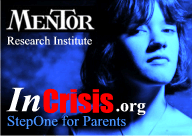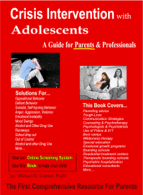|
 |
School,
Residential and Treatment Program Marketing: Misleading and
Deceptive Web Site
Wilderness
Therapy Treatment - A
non-profit consumer protection information, health, safety,
referral & education site.
Comprehensive Information:
www.WildernessTherapy.Org
|
By: Michael Conner, Psy.D
Mentor Research Institute:
Revised:
05/21/2014
Summary
There are several
networks and referral resources on the internet that mislead, deceive and
outsight lie to parents and professionals about the services that programs
provide.
Finding a safe, effective and ethical
sources of information, treatment and treatment programs for youth
at-risk can be a
challenge.
Many parents and professionals are turning to the internet to find support
and solutions for troubled teens. The world wide web (www) or
"web" was developed to provide a reliable and objective source
of information exchange to the public. Advertising and marketing practices
have created problems for consumers searching for information on the web
in the manner the web was intended to operate.
How Parents Use the Internet
The web provides an excellent opportunity for parents and professionals to
compare, evaluate and "shop" for professional services,
information resources and programs. Parents can go directly to a web site by
entering the web site address directly (also call a URL) or they may use a search engine to locate information on a variety of
topics. The primary uses of the web by parents and professionals include,
-
Researching
problems. This might include gathering information on
parenting, problem behavior, specific disorders and treatment
approaches.
-
Finding programs. This might
include locating treatment resources such as residential treatment
programs, therapeutic boarding schools, traditional boarding schools,
evaluation centers, wilderness therapy programs, outdoor schools and
adventure based programs.
-
Investigating a specific program.
Many programs have web sites that provide information regarding their
programs and services.
-
Finding consumer protection information.
This might include finding news, articles and other information resources that are intended to support
public health, safety, referrals and the delivery of professional services.
How Programs Use The Internet
Programs use the web for a variety of purposes. The overall purpose
of the web is to generate referrals and to
encourage parents and professionals to contact programs. Secondary
purposes are to facilitate admissions, public relations and to foster
better communication between programs, professionals and parents.
Differences between programs can be
tremendous. In addition, the amount of information and detail provided by programs
on their web site can vary a great deal. This can make it difficult to
investigate programs on the web.
Contact information and a general overview
are usually provided on most web sites. A few programs provide detailed information pertaining
to the program's ownership, structure, staffing, philosophy, cost, policies and
procedures. The best web sites provide complete, detailed, clear and
honest descriptions of their program.
Deceptive, Misleading And Unethical
Practices
Residential, wilderness and other treatment
program web sites can be misleading, out-of-date and incomplete sources
of information. The following provides an overview of various marketing practices on the internet that can be deceptive, misleading or
unethical.
-
False And
Deceptive Advertising. There are at least two
large residential
intervention and boarding school programs in
the country that routinely use what some might conclude is deceptive
and false advertising for purposes of misleading consumers. For
instance, if you conducted an information
search using the key words "Wilderness Programs" you would be directed
to a web site that supposedly offers wilderness therapy and provides an
opportunity for you to give your name and other contact information.
You might notice that the web site has no information to contact
or identify who's web site you have contacted. You are then mailed
information about a program that does not have a wilderness program
but is boarding school in another country.
Several programs mislead consumers regarding what they offer in order
to get you to contact them. They offer free questionnaires and free
consultations but in fact they only refer to their own programs.
-
"Racketeering" and
Fraudulent Advertising. There is at least one corporation that many people
in various industries fear because they routinely file law suits against
anyone who challenges their practices. The owners of these businesses
hide behind layers of corporate protections while paying another business
to market and sell their program. Their marketing and advertising
practices are outright deceptive, misleading and dishonest. Their web
site are fraudulent and border on what some might consider
"racketeering".
-
Web Site Is
Incorrect or Out-Of-Date. There are several programs in the United States that publish web
sites that grossly misrepresent their program's staffing, structure,
philosophy, ethical standards and financial status. The reasons for false
information on some web sites is not clear. But investigating programs
may reveal that significant changes in staffing,
management, program structure, follow-up programs, etc.., have taken
place or the web site has not been updated for a long time. Parents and
professionals who do not investigate information on web sites in
detail may eventually discover they enrolled
their child in a program under mistaken assumptions and false information.
-
The Promise of Cures
Or Unbelievable Services. In an effort
to gain more referrals, some wilderness programs are publishing web pages
that make outrageous promises and claims regarding cures and treatment of serious
problems. Parents are drawn to these web sites when using "search
engines" and key word searches regarding problems their children
may have. Consumers should be cautious and thoroughly investigate a program
that claims to treat or cure alcohol and drug problems as well as psychiatric
disorders. There are no cures for Attention
Deficit Disorder but some people claim to offer these cures. Parents and professionals may be misled regarding the
outcome if a child is referred to a program. The
people marketing their service may not be representing their program
honestly or completely.
-
Misleading Purpose Of A Web Site.
There are a number of web sites that appear to provide free referral
support and guidance to parents and professionals. Visitors are attracted
to these web sites believing they are visiting an objective information
resource. Visitors to these so-called information web sites
will first notice how these web sites
provide very little information that would be of assistance to parents and
professionals who hope to investigate, locate or evaluate programs. A closer
investigation will reveal that many of these web sites are actually owned and
operated by a company that owns a large network of wilderness or residential treatment
programs. These web sites refer parents and professionals to programs
owned by that company.
-
Tricking Search
Engines. Information can be located on
the internet by the use of search engines. Ethical programs and web site
developers create web sites that are
referenced using key words that both describe their program and use
keywords that parents and professionals are most likely
to use. Unethical programs use key words and design their web sites to
trick parents and professionals into visiting their web site. They do
this by using keywords and developing web pages that mislead people
regarding the actual content and purpose of the web page.
-
Paying
Search Engines To Give Priority. Programs have the ability to
pay search engine directly to get a priority placement or a higher
ranking for their web page. While one could argue that this is
legitimate advertising, some search engine results create the illusion
that a web site is a popular or "top" web site. The
original use and purposes of a search engine was to assist
people in locating useful information. Rather than list all the information
of a topic, which could be thousands of web pages, search engines
attempt to generate a smaller list of web sites using a
priority or ranking system. Priorities and ranking can be based on popularity, usefulness,
specific information or functionality of web sites. A few programs are
paying search engines to put
their programs at the top of lists.
-
Publishing
Under Different Web Site Names. One way to promote a web
site is to purchase several web site names (also called a Domain
Name). Programs can then publish
their materials on different web sites and submit these duplicated web
sites to search engines. This increases the likelihood that you
will see their program when searching the internet. This practice is
not approved by search engines because it results on a duplication of
content and undermines the purpose of the web. In fact, programs can
be removed from a search engine if the practice is discovered. Search
engines allow some duplication of content on multiple web sites
provided the web site has a legitimate purpose that is different from
other web sites.
-
Misleading
Web Site Names. Some programs publish web sites using names
that will be of interest to potential customers, but the actual
services provided are not consistent with the web site
name. The purpose of this practice is to increase the number of
people who visit their sites and to obtain an higher ranking on the
search engines.
Recommendations
-
Never assume
the information on a residential or wilderness program web site is
correct and complete.
-
Avoid any program that
markets using a 3rd party web site that uses deceptive or misleading
advertisements to draw consumers to their programs.
-
Obtain the
services an Educational or Behavioral Health
Consultant who is
qualified to recommend a program or consult with a resource that
knows the program thoroughly - including
the programs history and
most recent events.
-
Educate
yourself and ask informed questions when investigating a
program.
Copyright 2000 to 2011, Michael G. Conner
|


